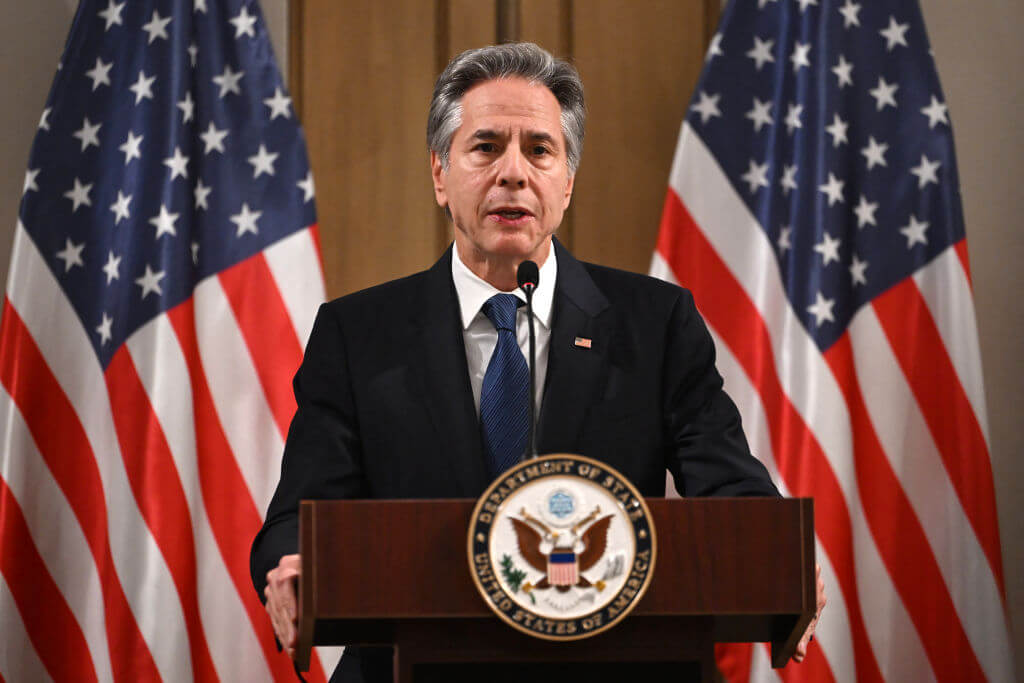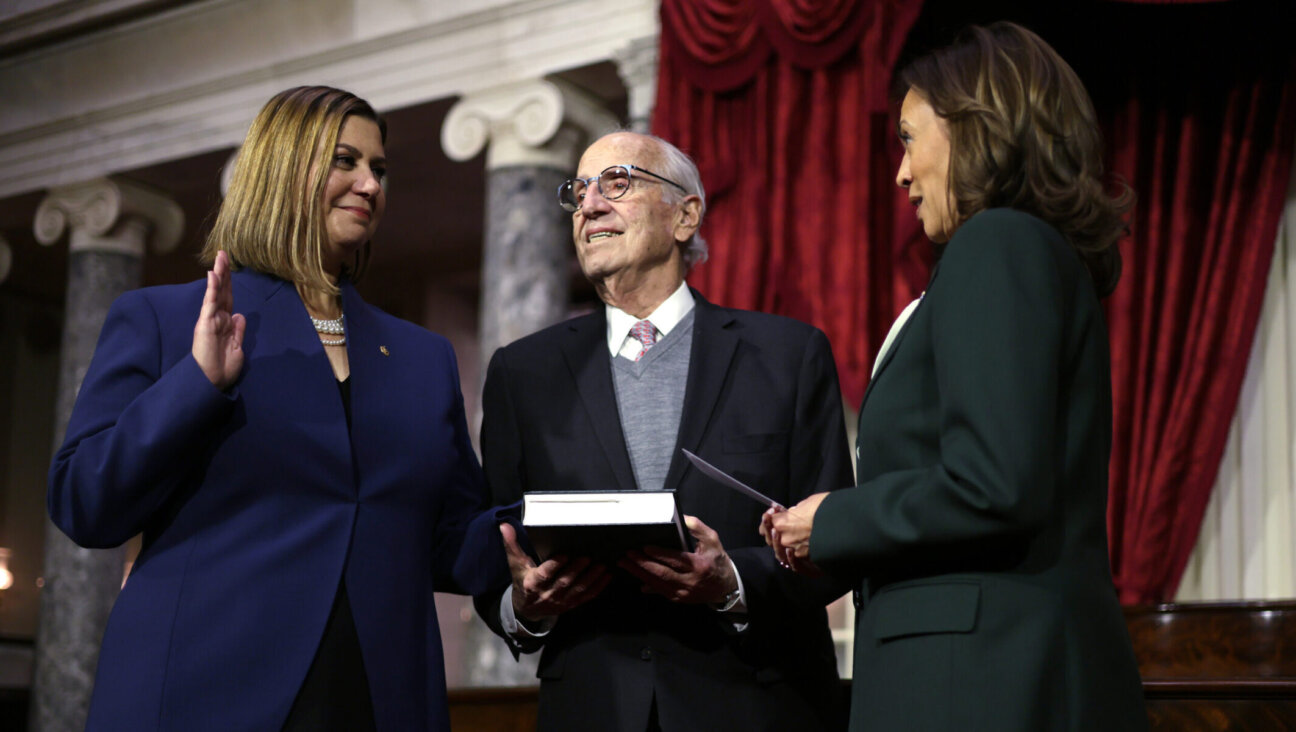Israel’s attorney general to consider declaring Netanyahu unfit for office
The AG will meet with officials to discuss whether Netanyahu has a conflict of interest with the judiciary as a result of his ongoing criminal trial, but sources insist that these are merely preliminary consultations

Benjamin Netanyahu speaks during a protest against the Israeli government on April 6, 2022. Photo by Amir Levy/Getty Images
This article originally appeared on Haaretz, and was reprinted here with permission. Sign up here to get Haaretz’s free Daily Brief newsletter delivered to your inbox.
Israel’s Attorney General Gali Baharav-Miara will consider declaring Prime Minister Benjamin Netanyahu unfit for office due to a conflict of interest owing to his ongoing criminal trial.
The attorney general will meet with senior jurists and Justice Ministry officials this week or next to discuss whether Netanyahu has a conflict of interest with the judiciary. While the meetings are said to be initial consultations, jurists have told Haaretz that the more the prime minister’s conflict of interest intensifies due to the trial, the greater the chance that the AG will force him to suspend himself from office.
The possibility of this scenario comes as the attorney general had to remind Netanyahu last week that he is still bound by the conflict of interest arrangement he signed three years ago, which applies to his current legal situation.
This means that Netanyahu is barred from making judicial appointments, or getting involved in legislative matters that may impact his ongoing trial. Netanyahu signed the arrangement three years ago when the attorney general at the time, Avichai Mandelblit, drew up the arrangement in order to prevent Netanyahu from being declared unfit for office.
But while Netanyahu is on trial for fraud, bribery and breach of trust at the Jerusalem district court, his government is pushing through dramatic judicial overhaul legislation – including laws that could impact his legal situation. For example, if the ruling coalition controls the Judicial Selection Committee, it will have the power to promote the judges involved in Netanyahu’s trial.
In his conversation with politicians and jurists over the last weeks, Netanyahu has expressed his unwavering support for Justice Minister Yariv Levin’s reform package which includes the judicial override clause, the politicization of the selection process for judges and the gutting of the attorney general’s authority.
Baharav-Miara’s opinion, arguing that Netanyahu’s 2019 conflict of interest arrangement was still in force, was submitted to the Supreme Court in response to a petition filed by the Movement for Quality Government in Israel, and members of Bastion of Democracy, represented by attorney Dafna Holz-Lechner.
The petitioners demanded that Netanyahu comply with a conflict of interest arrangement in order to prevent him from forming government. “My job, and the job of the Office of the Attorney General, is to support elected officials to realize their policies in accordance with the law,” the AG wrote in a letter to the prime minister that was added as a supplement to her response to the petition.
Baharav-Miara stated that “for any question that arises regarding what is said in the opinion” or regarding Netanyahu’s activity as prime minister, “Deputy Attorney General Gil Limon should be consulted so that the matters will be thoroughly examined.”
She also said that any conflict of interest arrangement should be discussed with the legal adviser to the Prime Minister’s Office, Shlomit Barnea-Farago, and that she could advise Netanyahu on the issue as well.
To this day, Netanyahu has not consulted the attorney general nor anyone at the Justice Ministry regarding the conflict of interest arrangement. He rejected the arrangement, but the High Court of Justice ruled that he is bound by it.
In her decision, Supreme Court Chief Justice Esther Hayut wrote “The reality in which a prime minister holds office while an indictment for serious crimes relating to his professional integrity is being served against him is an unusual situation that requires extreme adherence to this principle [of conflict of interests].”
“A conflict of interest arrangement is required to ensure – both in terms of the actual decision-making and in terms of public visibility – that the personal matters involved in the indictment against the prime minister will not affect his functioning as the head of the executive authority,” Hayut added.
In 2021, before Baharav-Miara wrote her opinion, Netanyahu issued a statement saying that “The Attorney General is an unelected official and there is no logic in granting him such far-reaching authorities as the removal of a sitting Prime Minister. This is especially true as the attorney general authorities were not given to him by any law and the legislator actually chose not to allow him to influence the identity of the prime minister, a member of the Knesset cannot be prevented from serving as prime minister even if they are being indicted.”
At the time, Mandelblit opposed Netanyahu’s removal from office. In November 2019, he wrote that “At this moment, the existing circumstances do not establish a firm basis for a judicial decision according to which the prime minister is prevented from fulfilling his duties.”
A message from our Publisher & CEO Rachel Fishman Feddersen

I hope you appreciated this article. Before you go, I’d like to ask you to please support the Forward’s award-winning, nonprofit journalism so that we can be prepared for whatever news 2025 brings.
At a time when other newsrooms are closing or cutting back, the Forward has removed its paywall and invested additional resources to report on the ground from Israel and around the U.S. on the impact of the war, rising antisemitism and polarized discourse.
Readers like you make it all possible. Support our work by becoming a Forward Member and connect with our journalism and your community.
— Rachel Fishman Feddersen, Publisher and CEO




















